Henry II’s Empire England under the Norman

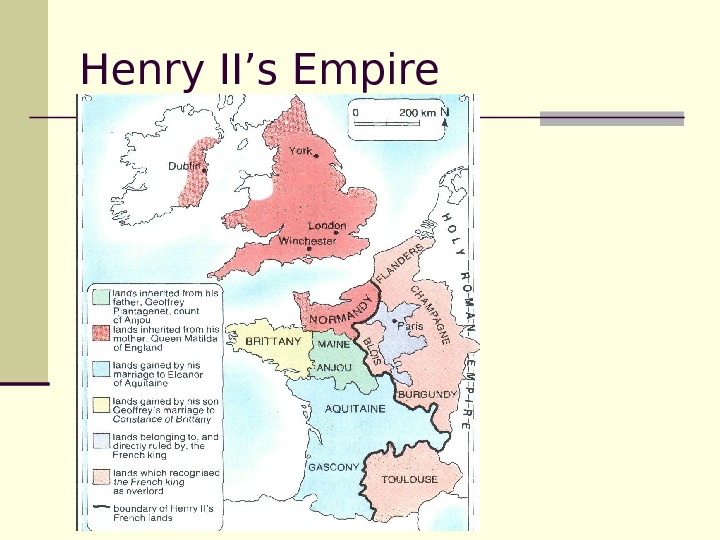
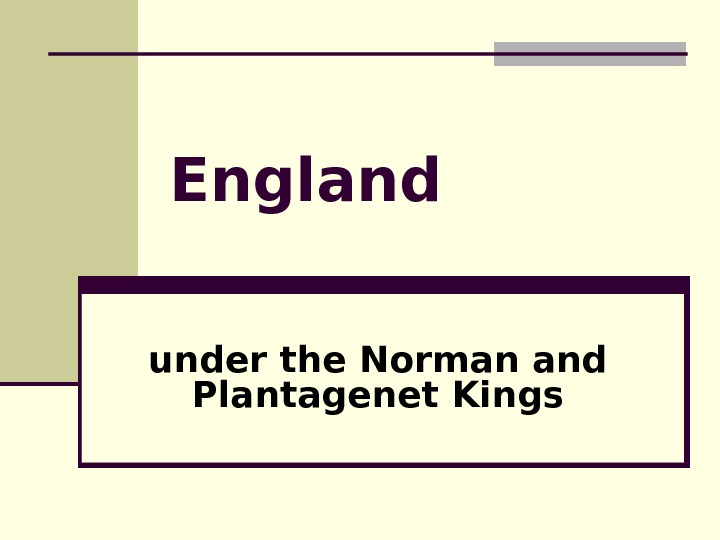
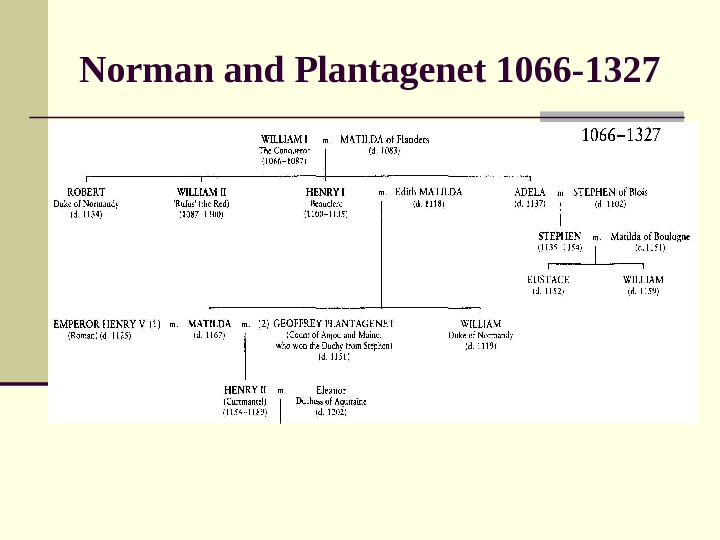
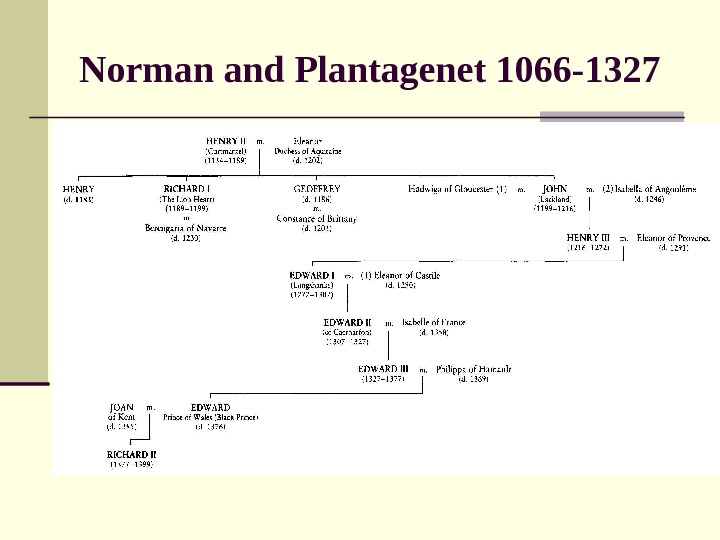
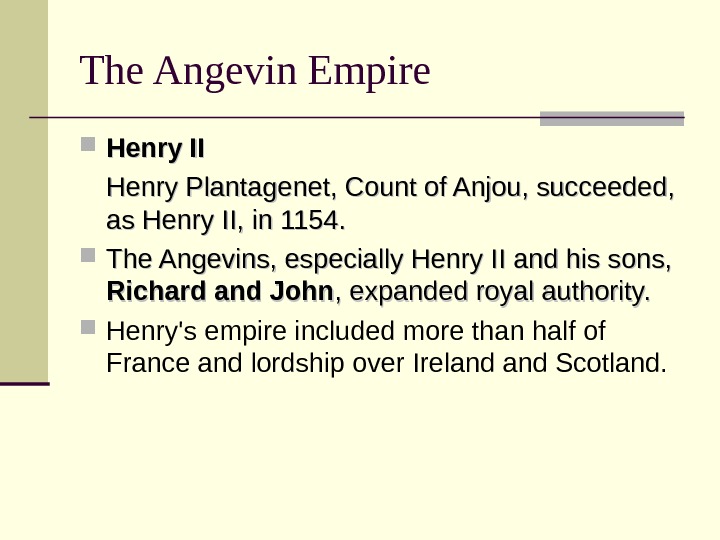
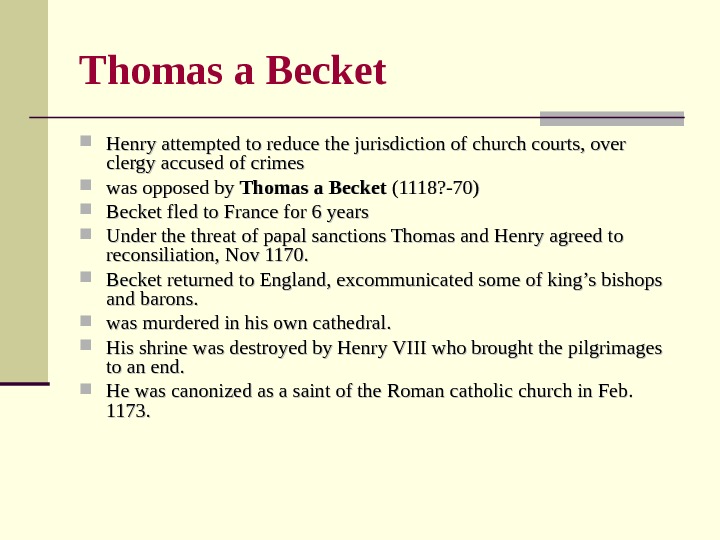
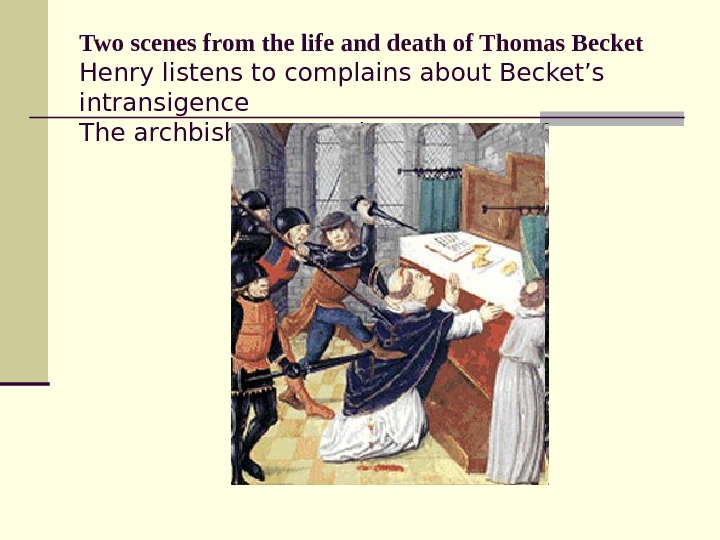
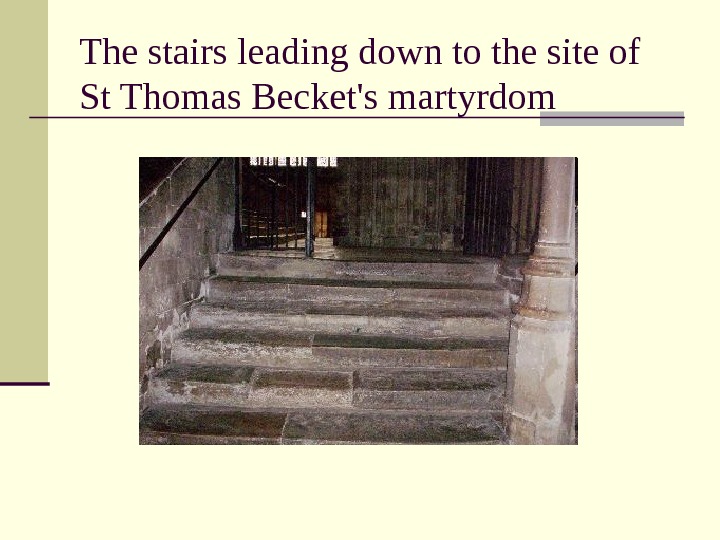
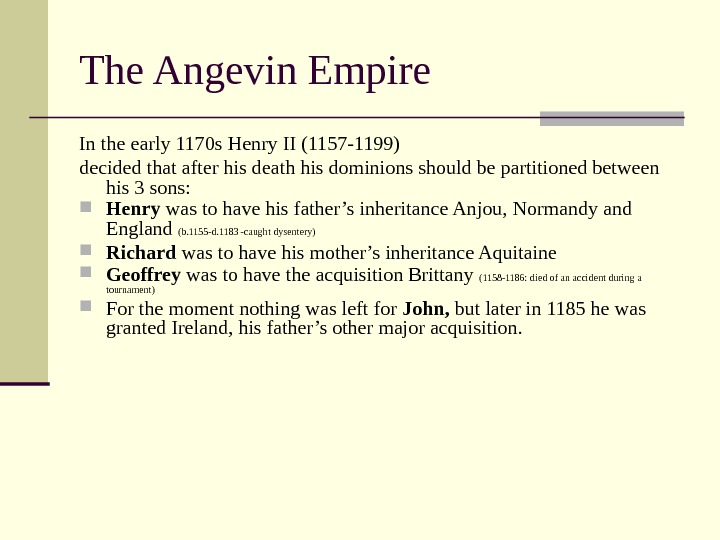
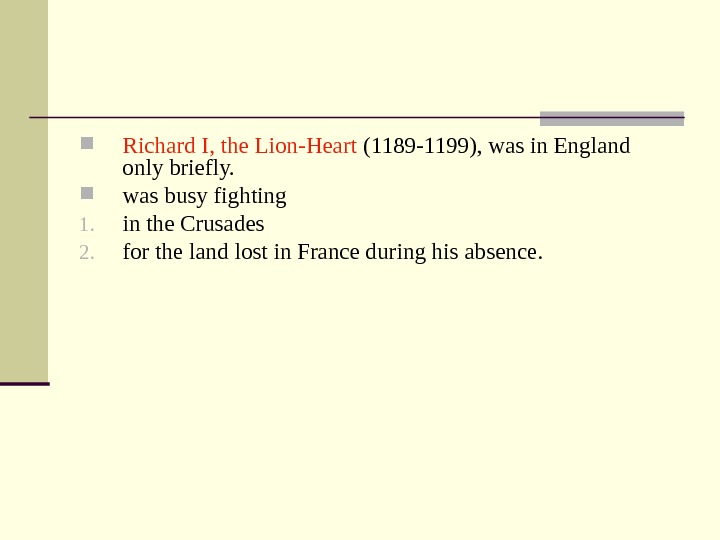
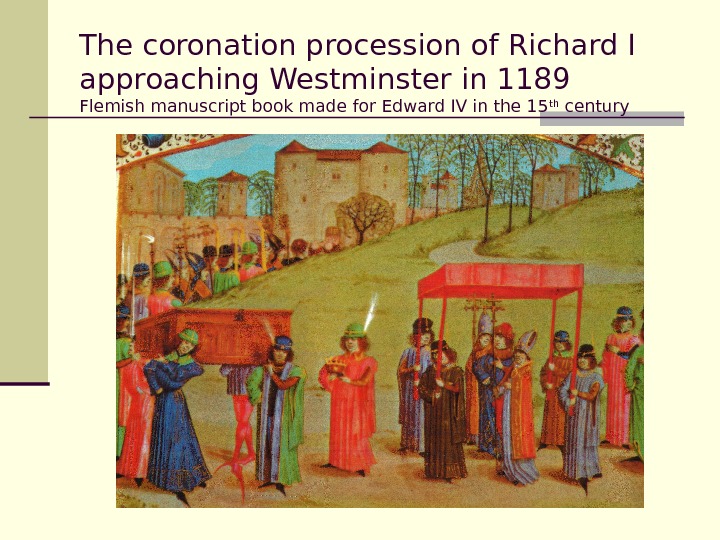
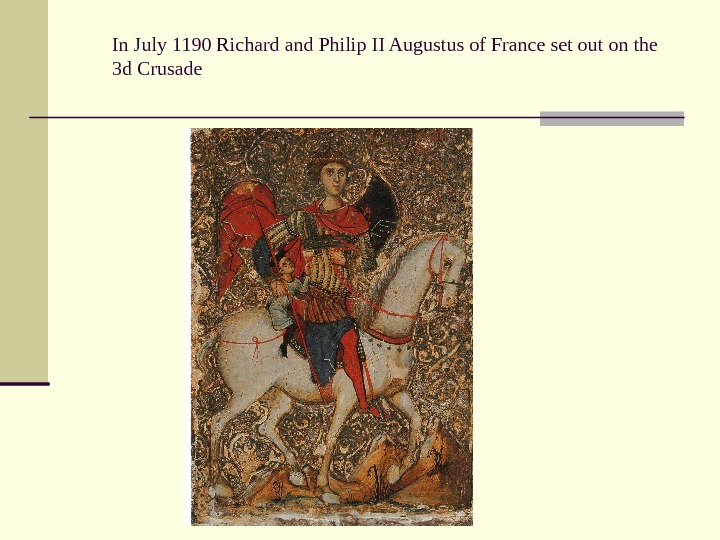
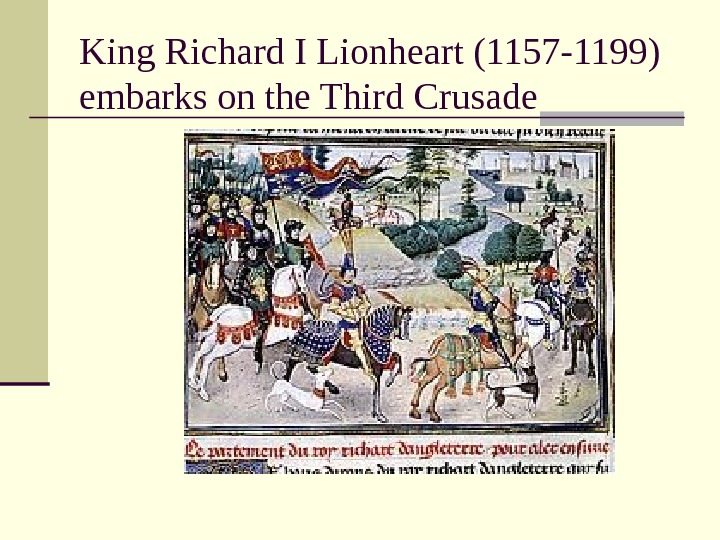
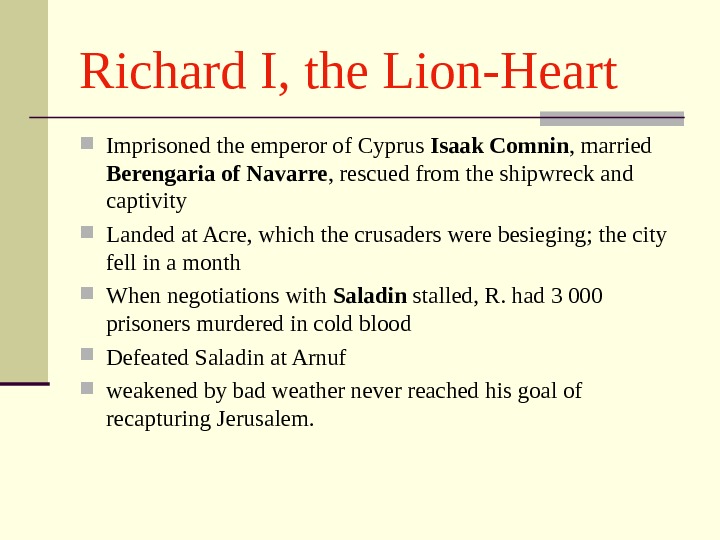
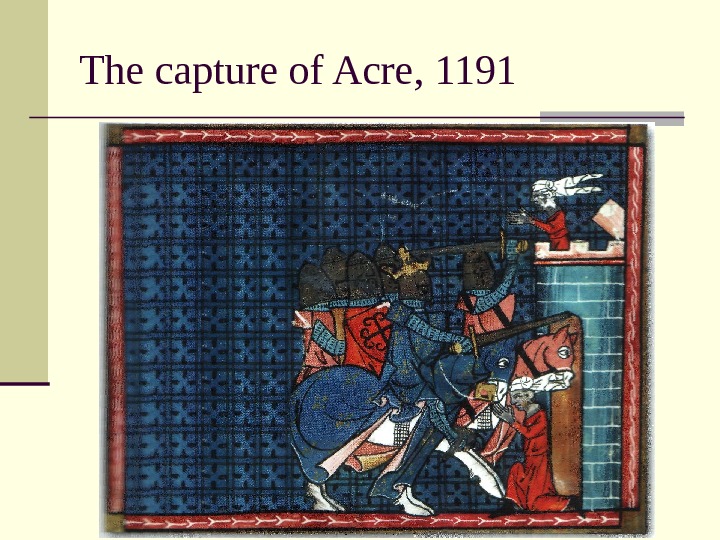
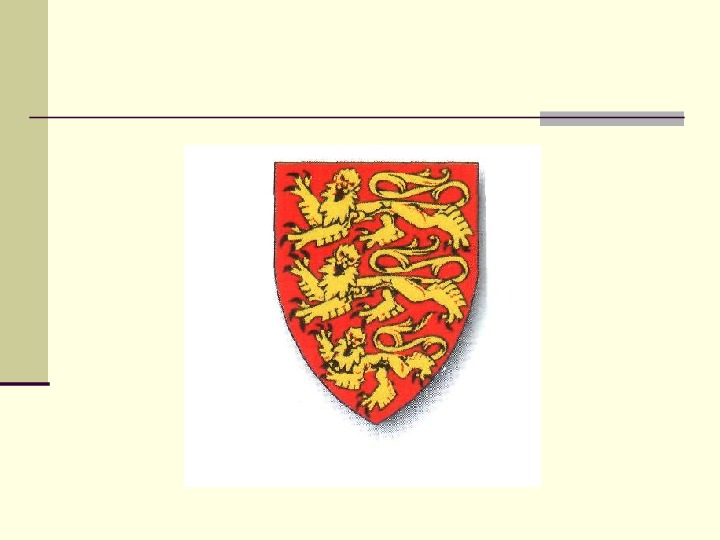
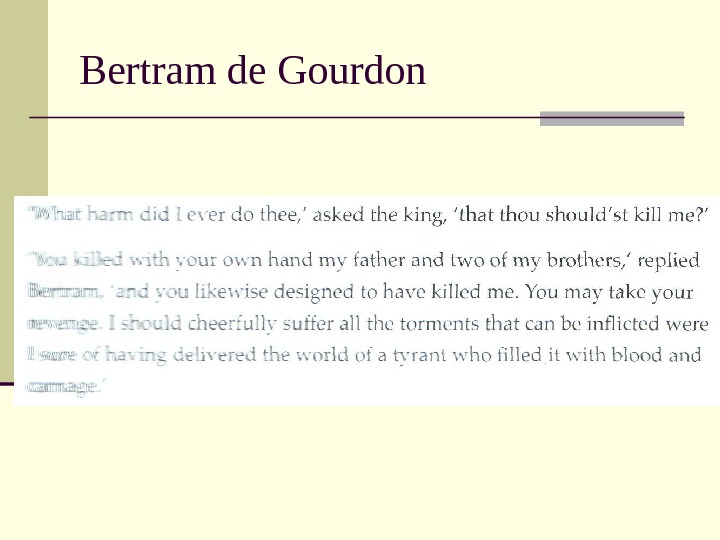
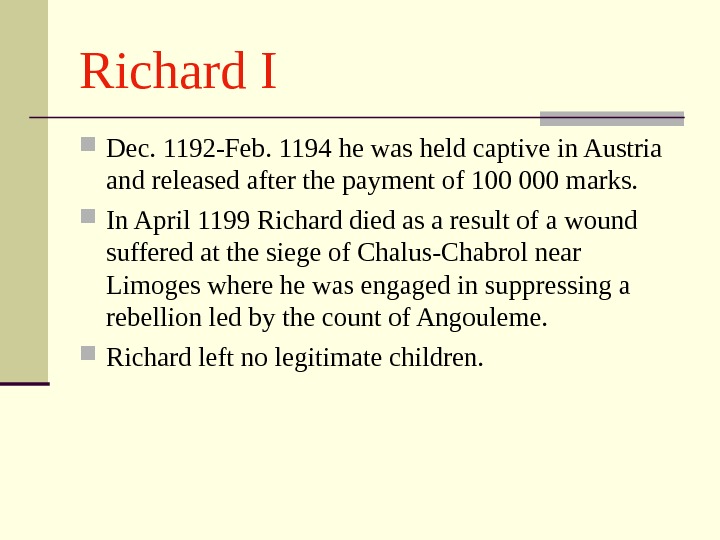
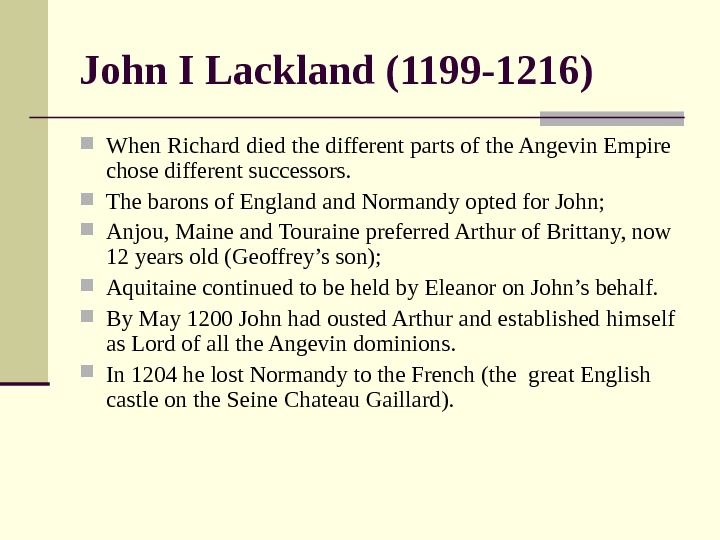
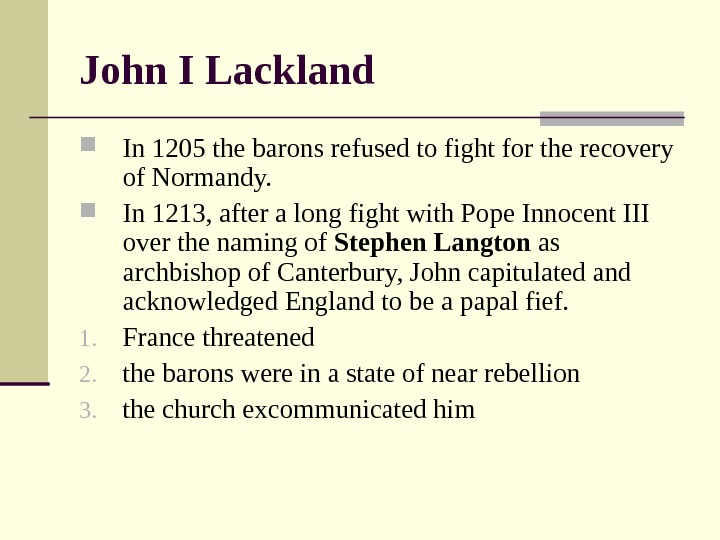
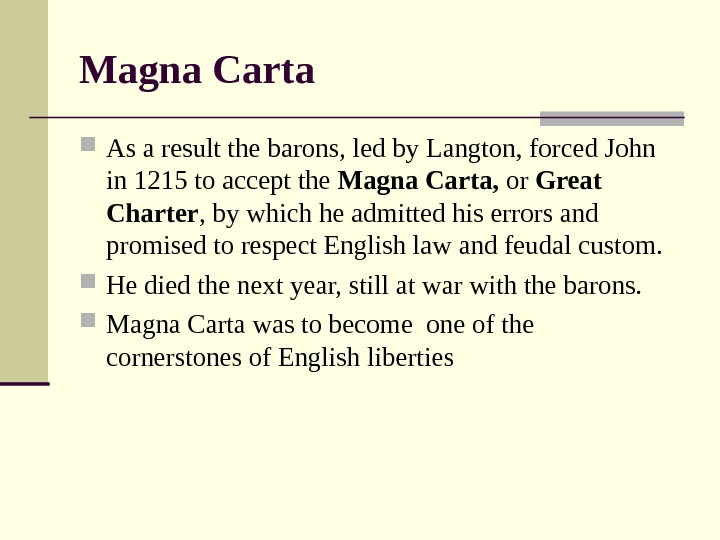
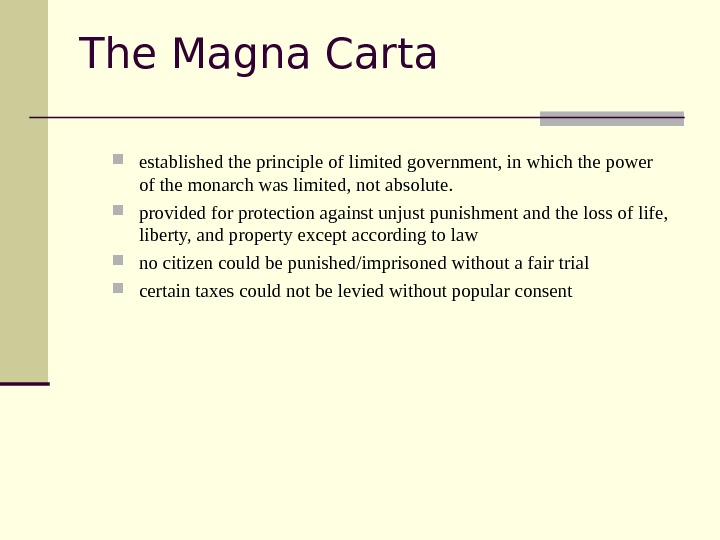
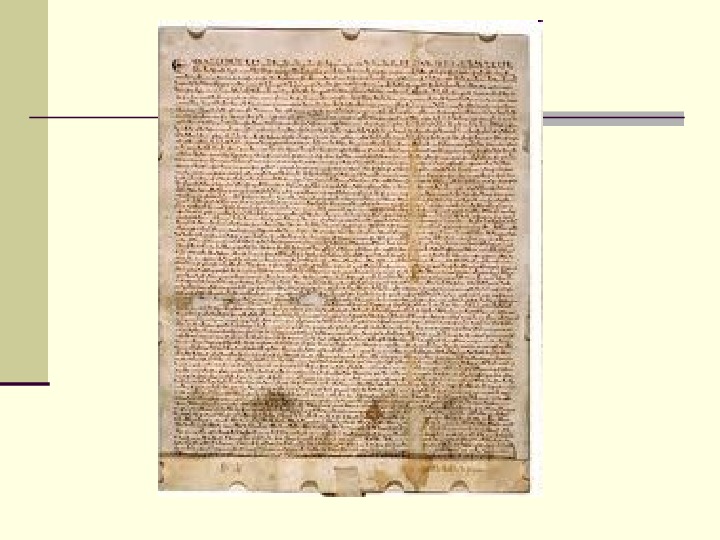
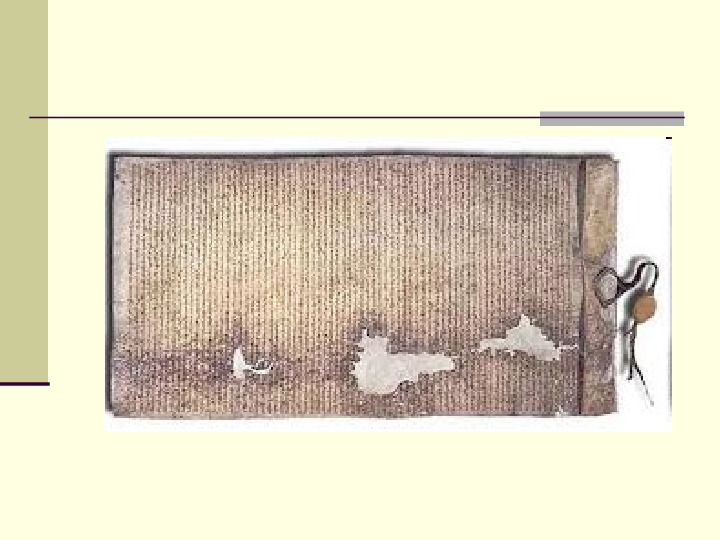
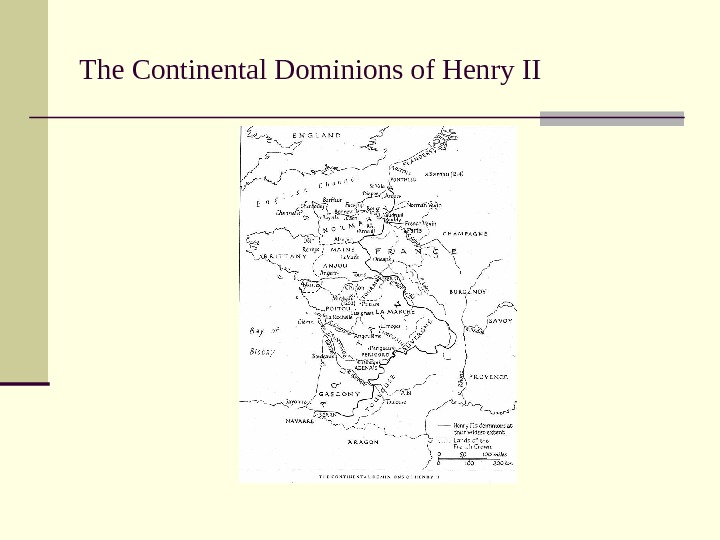
- Размер: 22.7 Mегабайта
- Количество слайдов: 25
Описание презентации Henry II’s Empire England under the Norman по слайдам
 Henry II’s Empire
Henry II’s Empire
 England under the Norman and Plantagenet Kings
England under the Norman and Plantagenet Kings
 Norman and Plantagenet 1066 —
Norman and Plantagenet 1066 —
 Norman and Plantagenet 1066 —
Norman and Plantagenet 1066 —
 The Angevin Empire Henry II Henry Plantagenet, Count of Anjou, succeeded, as Henry II, in 1154. The Angevins, especially Henry II and his sons, Richard and John , expanded royal authority. Henry’s empire included more than half of France and lordship over Ireland Scotland.
The Angevin Empire Henry II Henry Plantagenet, Count of Anjou, succeeded, as Henry II, in 1154. The Angevins, especially Henry II and his sons, Richard and John , expanded royal authority. Henry’s empire included more than half of France and lordship over Ireland Scotland.
 Thomas a Becket Henry attempted to reduce the jurisdiction of church courts, over clergy accused of crimes was opposed by Thomas a Becket (1118? -70) Becket fled to France for 6 years Under the threat of papal sanctions Thomas and Henry agreed to reconsiliation, Nov 1170. Becket returned to England, excommunicated some of king’s bishops and barons. was murdered in his own cathedral. His shrine was destroyed by Henry VIII who brought the pilgrimages to an end. He was canonized as a saint of the Roman catholic church in Feb. 1173.
Thomas a Becket Henry attempted to reduce the jurisdiction of church courts, over clergy accused of crimes was opposed by Thomas a Becket (1118? -70) Becket fled to France for 6 years Under the threat of papal sanctions Thomas and Henry agreed to reconsiliation, Nov 1170. Becket returned to England, excommunicated some of king’s bishops and barons. was murdered in his own cathedral. His shrine was destroyed by Henry VIII who brought the pilgrimages to an end. He was canonized as a saint of the Roman catholic church in Feb. 1173.
 Two scenes from the life and death of Thomas Becket Henry listens to complains about Becket’s intransigence The archbishop’s murder
Two scenes from the life and death of Thomas Becket Henry listens to complains about Becket’s intransigence The archbishop’s murder
 The stairs leading down to the site of St Thomas Becket’s martyrdom
The stairs leading down to the site of St Thomas Becket’s martyrdom
 The Angevin Empire In the early 1170 s Henry II (1157 -1199) decided that after his death his dominions should be partitioned between his 3 sons: Henry was to have his father’s inheritance Anjou, Normandy and England (b. 1155 -d. 1183 -caught dysentery) Richard was to have his mother’s inheritance Aquitaine Geoffrey was to have the acquisition Brittany (1158 -1186: died of an accident during a tournament) For the moment nothing was left for John, but later in 1185 he was granted Ireland, his father’s other major acquisition.
The Angevin Empire In the early 1170 s Henry II (1157 -1199) decided that after his death his dominions should be partitioned between his 3 sons: Henry was to have his father’s inheritance Anjou, Normandy and England (b. 1155 -d. 1183 -caught dysentery) Richard was to have his mother’s inheritance Aquitaine Geoffrey was to have the acquisition Brittany (1158 -1186: died of an accident during a tournament) For the moment nothing was left for John, but later in 1185 he was granted Ireland, his father’s other major acquisition.
 Richard I, the Lion-Heart (1189 -1199), was in England only briefly. was busy fighting 1. in the Crusades 2. for the land lost in France during his absence.
Richard I, the Lion-Heart (1189 -1199), was in England only briefly. was busy fighting 1. in the Crusades 2. for the land lost in France during his absence.
 The coronation procession of Richard I approaching Westminster in 1189 Flemish manuscript book made for Edward IV in the 15 th century
The coronation procession of Richard I approaching Westminster in 1189 Flemish manuscript book made for Edward IV in the 15 th century
 In July 1190 Richard and Philip II Augustus of France set out on the 3 d Crusade
In July 1190 Richard and Philip II Augustus of France set out on the 3 d Crusade
 King Richard I Lionheart (1157 -1199) embarks on the Third Crusade
King Richard I Lionheart (1157 -1199) embarks on the Third Crusade
 Richard I, the Lion-Heart Imprisoned the emperor of Cyprus Isaak Comnin , married Berengaria of Navarre , rescued from the shipwreck and captivity Landed at Acre, which the crusaders were besieging; the city fell in a month When negotiations with Saladin stalled, R. had 3 000 prisoners murdered in cold blood Defeated Saladin at Arnuf weakened by bad weather never reached his goal of recapturing Jerusalem.
Richard I, the Lion-Heart Imprisoned the emperor of Cyprus Isaak Comnin , married Berengaria of Navarre , rescued from the shipwreck and captivity Landed at Acre, which the crusaders were besieging; the city fell in a month When negotiations with Saladin stalled, R. had 3 000 prisoners murdered in cold blood Defeated Saladin at Arnuf weakened by bad weather never reached his goal of recapturing Jerusalem.
 The capture of Acre,
The capture of Acre,

 Bertram de Gourdon
Bertram de Gourdon
 Richard I Dec. 1192 -Feb. 1194 he was held captive in Austria and released after the payment of 100 000 marks. In April 1199 Richard died as a result of a wound suffered at the siege of Chalus-Chabrol near Limoges where he was engaged in suppressing a rebellion led by the count of Angouleme. Richard left no legitimate children.
Richard I Dec. 1192 -Feb. 1194 he was held captive in Austria and released after the payment of 100 000 marks. In April 1199 Richard died as a result of a wound suffered at the siege of Chalus-Chabrol near Limoges where he was engaged in suppressing a rebellion led by the count of Angouleme. Richard left no legitimate children.
 John I Lackland (1199 -1216) When Richard died the different parts of the Angevin Empire chose different successors. The barons of England Normandy opted for John; Anjou, Maine and Touraine preferred Arthur of Brittany, now 12 years old (Geoffrey’s son); Aquitaine continued to be held by Eleanor on John’s behalf. By May 1200 John had ousted Arthur and established himself as Lord of all the Angevin dominions. In 1204 he lost Normandy to the French (the great English castle on the Seine Chateau Gaillard).
John I Lackland (1199 -1216) When Richard died the different parts of the Angevin Empire chose different successors. The barons of England Normandy opted for John; Anjou, Maine and Touraine preferred Arthur of Brittany, now 12 years old (Geoffrey’s son); Aquitaine continued to be held by Eleanor on John’s behalf. By May 1200 John had ousted Arthur and established himself as Lord of all the Angevin dominions. In 1204 he lost Normandy to the French (the great English castle on the Seine Chateau Gaillard).
 John I Lackland In 1205 the barons refused to fight for the recovery of Normandy. In 1213, after a long fight with Pope Innocent III over the naming of Stephen Langton as archbishop of Canterbury, John capitulated and acknowledged England to be a papal fief. 1. France threatened 2. the barons were in a state of near rebellion 3. the church excommunicated him
John I Lackland In 1205 the barons refused to fight for the recovery of Normandy. In 1213, after a long fight with Pope Innocent III over the naming of Stephen Langton as archbishop of Canterbury, John capitulated and acknowledged England to be a papal fief. 1. France threatened 2. the barons were in a state of near rebellion 3. the church excommunicated him
 Magna Carta As a result the barons, led by Langton, forced John in 1215 to accept the Magna Carta, or Great Charter , by which he admitted his errors and promised to respect English law and feudal custom. He died the next year, still at war with the barons. Magna Carta was to become one of the cornerstones of English liberties
Magna Carta As a result the barons, led by Langton, forced John in 1215 to accept the Magna Carta, or Great Charter , by which he admitted his errors and promised to respect English law and feudal custom. He died the next year, still at war with the barons. Magna Carta was to become one of the cornerstones of English liberties
 The Magna Carta established the principle of limited government, in which the power of the monarch was limited, not absolute. provided for protection against unjust punishment and the loss of life, liberty, and property except according to law no citizen could be punished/imprisoned without a fair trial certain taxes could not be levied without popular consent
The Magna Carta established the principle of limited government, in which the power of the monarch was limited, not absolute. provided for protection against unjust punishment and the loss of life, liberty, and property except according to law no citizen could be punished/imprisoned without a fair trial certain taxes could not be levied without popular consent


 The Continental Dominions of Henry II
The Continental Dominions of Henry II

